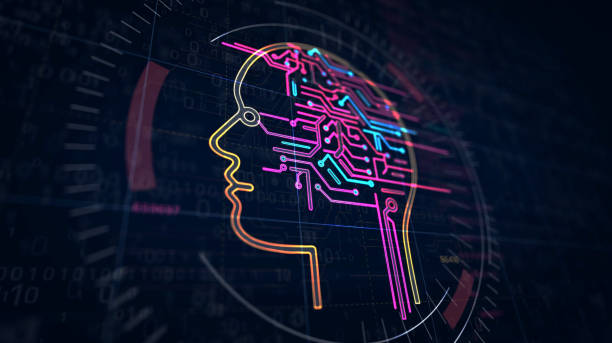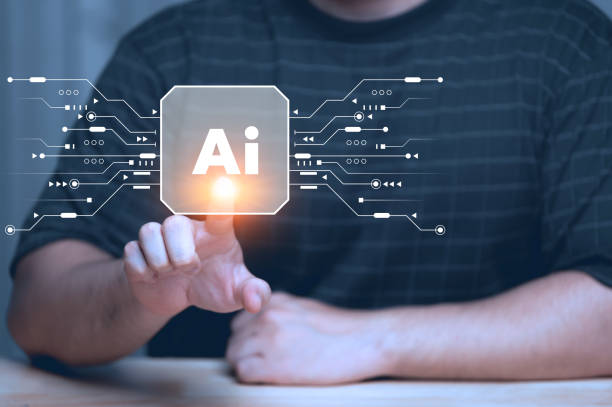What is Artificial Intelligence? Definition, History, and Key Concepts

#Artificial_Intelligence (AI) is a branch of computer science that focuses on building intelligent machines capable of performing tasks that typically require human intelligence.
These tasks include learning, reasoning, problem-solving, perception, and natural language understanding.
The history of artificial intelligence dates back to the 1950s when scientists first contemplated the possibility of creating thinking machines.
The term “Artificial Intelligence” was first coined by John McCarthy in 1956.
Key concepts in artificial intelligence include machine learning algorithms, neural networks, natural language processing (NLP), computer vision, and robotics.
Machine learning enables machines to learn from data without being explicitly programmed.
Neural networks are models inspired by the structure of the human brain, used for pattern recognition and prediction.
Natural language processing allows machines to understand and generate human language.
Computer vision enables machines to see and understand images.
Robotics deals with the design and construction of robots that can perform physical tasks.
To better understand these concepts, you can refer to specialized articles in this field on Wikipedia.
Today, artificial intelligence has become a transformative technology used in various industries, including healthcare, finance, transportation, and manufacturing.
Did you know that 85% of customers check your company’s website before any interaction?
With RasaWeb, build a corporate website worthy of your credibility.
✅ Increase credibility and customer trust
✅ Attract high-quality leads
⚡ Get free website design consultation
Types of Artificial Intelligence: Approaches and Categories

Artificial intelligence can be divided into different categories based on capabilities and functions.
One of the most common classifications is the division of AI into Narrow AI and General AI.
Narrow AI is designed to perform a specific task, such as facial recognition or language translation.
General AI refers to a machine that can perform any intellectual task that a human is capable of.
Another classification is based on the learning method.
This classification divides AI into supervised, unsupervised, and reinforcement learning.
In supervised learning, the algorithm is trained using labeled data.
In unsupervised learning, the algorithm searches for patterns in unlabeled data.
In reinforcement learning, the algorithm learns by interacting with an environment and receiving rewards or penalties.
Exploring different AI approaches can provide you with a better perspective.
Evolutionary AI is another type of artificial intelligence that uses principles of natural evolution to solve problems.
This type of AI is commonly used for optimizing algorithms and designing complex systems.
The choice of appropriate AI depends on the type of problem and available data.
Applications of Artificial Intelligence in Various Industries: Practical Examples

Artificial intelligence has wide-ranging applications across various industries.
In healthcare, AI is used for diagnosing diseases, developing new drugs, and improving patient care.
In finance, AI is employed for fraud detection, risk management, and providing financial advice.
In transportation, AI is utilized for developing self-driving cars, optimizing traffic, and enhancing safety.
Exploring various AI applications can give you a better perspective.
In manufacturing, AI is used for process automation, quality improvement, and cost reduction.
In retail, AI is employed for personalizing customer experience, optimizing pricing, and forecasting demand.
Artificial intelligence is transforming the way we work and live, and it is expected to play an even more significant role in the future.
For example, major companies like Google (Google AI) and Microsoft (Microsoft AI) have made significant investments in this field.
Examples:
- Healthcare: Cancer detection through medical imaging
- Finance: Fraud detection in banking transactions
- Transportation: Self-driving cars
- Manufacturing: Industrial robots
- Retail: Recommender systems
| Industry | Application |
|---|---|
| Healthcare | Disease Diagnosis |
| Finance | Fraud Detection |
| Transportation | Self-driving Cars |
| Manufacturing | Automation |
Machine Learning: Key Algorithms and Techniques

Machine Learning is a subset of artificial intelligence that enables machines to learn from data without being explicitly programmed.
Machine learning algorithms use data to identify patterns and build models that can be used for prediction or decision-making.
More information on machine learning can be helpful in this regard.
Key techniques in machine learning include supervised learning, unsupervised learning, and reinforcement learning.
Supervised learning algorithms include linear regression, logistic regression, Support Vector Machines (SVM), and neural networks.
Unsupervised learning algorithms include K-means clustering, Principal Component Analysis (PCA), and association rule algorithms.
Reinforcement learning algorithms include Q-learning and SARSA.
The choice of the appropriate algorithm depends on the type of data and the problem at hand.
Deep Learning is an advanced type of machine learning that uses neural networks with multiple layers to learn complex patterns in data.
Deep neural networks have achieved remarkable results in various fields such as computer vision, natural language processing, and speech recognition.
For example, facial recognition in smartphones and machine translation are applications of deep neural networks.
Are you dissatisfied with your e-commerce website’s low sales?
RasaWeb is your solution for having a professional and high-selling e-commerce website.
✅ Significant increase in sales and revenue
✅ Easy and enjoyable shopping experience for customers
⚡ Get a free consultation from RasaWeb right now!
Natural Language Processing: Understanding and Generating Language by Machine

Natural Language Processing (NLP) is a branch of artificial intelligence that enables machines to understand and generate human language.
NLP includes tasks such as machine translation, text summarization, sentiment analysis, and question answering.
Further study on natural language processing can be helpful in this regard.
To understand language, NLP algorithms use techniques such as syntactic parsing, semantic analysis, and context understanding.
Syntactic parsing analyzes the grammatical structure of a sentence.
Semantic analysis focuses on understanding the meaning of words and phrases.
Context understanding involves comprehending the meaning of a sentence within a larger text.
To generate language, NLP algorithms use techniques such as text generation, word selection, and sentence structuring.
These techniques together enable AI to produce meaningful texts.
NLP is used in various applications such as chatbots, virtual assistants, and machine translation systems.
Chatbots are programs that can interact with humans via text or voice.
Virtual assistants like Siri and Alexa use NLP to understand voice commands and answer questions.
Machine translation systems like Google Translate use NLP to translate text from one language to another.
Ethics and Accountability in Artificial Intelligence: Challenges and Considerations

With the advancement of artificial intelligence, ethical and accountability issues related to this technology become more important.
One of the main challenges is bias in AI algorithms.
If the data used to train the algorithms is biased, the algorithms may also learn discriminatory behaviors.
This can lead to unfair decision-making in various fields such as employment, lending, and law enforcement.
Understanding ethical issues in artificial intelligence is crucial for the responsible development of this technology.
Another challenge is the issue of privacy.
AI systems often require large amounts of personal data to function effectively.
The collection and use of this data can raise concerns about individual privacy.
For example, facial recognition systems can be used to monitor individuals without their consent.
The issue of accountability is also important.
If an AI system makes a mistake, who will be responsible? The system developer, the user, or the system itself?
To address these challenges, developers, researchers, and policymakers must collaborate to establish standards and regulations that ensure the responsible use of artificial intelligence.
These standards and regulations should address issues such as transparency, accountability, and privacy.
The development of artificial intelligence should be in line with the interests of society.
The Future of Artificial Intelligence: Trends, Predictions, and Possibilities

The future of artificial intelligence is full of potential and uncertainty.
AI is expected to play a more significant role in our lives and bring about major transformations across various industries.
One of the main trends is advancements in deep machine learning.
Deep neural networks have already achieved remarkable results in diverse fields and are expected to make further progress in the future.
A look into the future of artificial intelligence can provide you with a better perspective.
Another trend is the development of Explainable Artificial Intelligence (XAI).
XAI focuses on developing algorithms that can explain how they make decisions.
This can help increase trust and acceptance of artificial intelligence.
AI is increasingly being integrated with the Internet of Things (IoT).
This integration can lead to the development of smarter systems that can collect data from sensors and make decisions based on them.
For example, smart home systems can adjust home temperature or turn lights on and off using sensor data.
However, it should be noted that the development of artificial intelligence also comes with risks.
One of the main risks is job displacement.
AI-powered automation can lead to the replacement of human labor in many industries.
To counter this risk, governments and companies need to invest in training and retraining the workforce so that individuals can acquire new skills and work in new jobs.
| Trend | Description |
|---|---|
| Deep Machine Learning | Advancements in algorithms and neural network architectures |
| Explainable AI (XAI) | Development of algorithms that can explain their decisions |
| Internet of Things (IoT) | Integration of AI with connected devices |
| Automation | Replacement of human labor by AI systems |
Artificial Intelligence and Its Impact on the Job Market: Opportunities and Threats

Artificial intelligence has a significant impact on the job market, creating both opportunities and threats.
On one hand, AI can lead to the creation of new jobs in fields such as AI development, data science, and robotics engineering.
Additionally, AI can increase workforce productivity and efficiency by automating repetitive and tedious tasks.
An analysis of AI’s impact on the job market can provide more detailed information.
On the other hand, AI can lead to job displacement in fields that are easily automatable, such as manufacturing, transportation, and customer service.
For example, self-driving cars can render taxi and truck drivers jobless.
To counter this threat, governments and companies need to invest in training and retraining the workforce so that individuals can acquire new skills and work in new jobs.
Furthermore, policies must be formulated to support individuals who lose their jobs.
Artificial intelligence will ultimately change how we work and live.
To leverage the opportunities created by AI and mitigate its threats, it is essential for all members of society, including employees, employers, and policymakers, to become familiar with this technology and be prepared to face its challenges.
Did you know that customers’ first impression of your company is your website? With a powerful corporate website from RasaWeb, multiply your business’s credibility!
✅ Custom and eye-catching design tailored to your brand
✅ Improved user experience and increased customer attraction
⚡ Get a free consultation!
AI Learning Resources: Introducing Courses, Books, and Useful Tools

Various resources are available for learning artificial intelligence.
There are online courses, books, and various tools that can help you learn AI concepts and techniques.
Some popular online courses in AI include those from Coursera, edX, and Udacity.
These courses are offered by reputable universities and leading experts in the field of AI.
Introducing the best AI learning resources can help you choose suitable materials.
Many books are also available in the field of artificial intelligence that can help you gain a deeper understanding of the concepts.
Some best-selling books in this area include “Artificial Intelligence: A Modern Approach” by Stuart Russell and Peter Norvig, and “Machine Learning” by Tom Mitchell.
Various tools are also available for developing AI systems.
Some popular tools include TensorFlow, Keras, and PyTorch.
These tools provide powerful libraries for machine learning and neural networks.
Artificial intelligence is a dynamic and evolving field.
Furthermore, various forums and conferences in the field of artificial intelligence can help you connect with other experts and learn about the latest advancements.
Participating in these events can help you expand your professional network and learn from the experiences of others.
Conclusion: Artificial Intelligence – An Opportunity for Transformation and Progress

Artificial intelligence is a powerful technology that can improve our lives in various ways.
From healthcare to transportation and manufacturing, AI has the potential to bring about significant transformations.
However, it is essential that this technology be developed responsibly and with consideration for ethical and social issues.
To leverage the opportunities created by AI and mitigate its threats, all members of society, including employees, employers, and policymakers, must become familiar with this technology and be prepared to face its challenges.
Furthermore, investment in workforce training and retraining must be increased so that individuals can acquire new skills and work in new jobs.
Additionally, policies must be formulated to support individuals who lose their jobs.
Artificial intelligence is the key to solving many global problems.
Through collaboration and collective effort, we can use artificial intelligence to create a better future for everyone.
Artificial intelligence is a unique opportunity for progress and flourishing.
By correctly understanding and optimally utilizing artificial intelligence, we can create a smarter, more efficient, and more equitable world.
This technology is like a double-edged sword, and its correct and conscious use is crucial.
So, let’s step towards building a brighter future using artificial intelligence.
Frequently Asked Questions
| Question | Answer |
|---|---|
| 1. What is Artificial Intelligence (AI)? | It is a branch of computer science that aims to create machines capable of simulating human intelligence and performing tasks that require human thinking, such as learning, problem-solving, and decision-making. |
| 2. What are the main types of Artificial Intelligence? | They can be classified into Narrow AI, which focuses on a specific task, General AI, which possesses comprehensive human-like capabilities, and Super AI, which surpasses human intelligence. |
| 3. Mention some common applications of Artificial Intelligence in our daily lives. | These include voice assistants (like Siri and Alexa), recommendation systems (like Netflix and Amazon), self-driving cars, facial recognition systems, and spam filters. |
| 4. What is the difference between Artificial Intelligence and Machine Learning? | Artificial intelligence is the broader concept of creating intelligent machines, while machine learning is a subset of AI that focuses on enabling systems to learn from data without explicit programming. |
| 5. What is Deep Learning? | It is a subset of machine learning that uses multi-layered artificial neural networks (deep neural networks) to process data and detect complex patterns, used in image and speech recognition. |
| 6. What are the most prominent benefits of Artificial Intelligence? | Improved efficiency and productivity, automation of repetitive tasks, better decision-making based on big data analysis, and the development of solutions to complex problems in fields such as medicine and science. |
| 7. What are the main challenges facing the development and deployment of Artificial Intelligence? | These include the need for massive amounts of high-quality data, privacy and security issues, bias in data and algorithms, and high development and maintenance costs. |
| 8. Does Artificial Intelligence raise ethical or social concerns? | Yes, it raises concerns related to privacy, algorithmic bias, job displacement due to automation, accountability for errors made by intelligent systems, and the need for a regulatory framework. |
| 9. How can Artificial Intelligence affect the future of the job market? | It can lead to the automation of some routine jobs, but it will also create new jobs requiring advanced skills in developing, operating, and maintaining AI systems. |
| 10. What are some modern or promising technologies in the field of Artificial Intelligence? | These include advanced Natural Language Processing (NLP) (such as large language models like ChatGPT), computer vision, robotics, and Generative AI. |
And other advertising agency services by Rasa Web in the field of advertising
- Smart SEO: A combination of creativity and technology for digital branding through user experience customization.
- Smart Sales Automation: Professional optimization for online growth using user experience customization.
- Smart Social Media: A creative platform to improve click-through rates with precise audience targeting.
- Smart Custom Software: An effective tool for online growth with the help of real data.
- Smart SEO: A new service for increasing digital branding through user experience customization.
And more than hundreds of other services in the field of internet advertising, advertising consultation, and organizational solutions
Internet Advertising | Advertising Strategy | Advertorial
References
AI Applications in IranThe Future of AI and JobsThe Impact of AI on Daily LifeThe Most Important Challenges of AI
? Ready to revolutionize your business in the digital world? RasaWeb Afarin Digital Marketing Agency paves the way for your greater visibility by offering comprehensive services, including SEO-optimized website design, search engine optimization, and content marketing.
📍 Tehran, Mirdamad Street, next to the Central Bank, South Kazeroon Alley, Ramin Alley, No. 6




